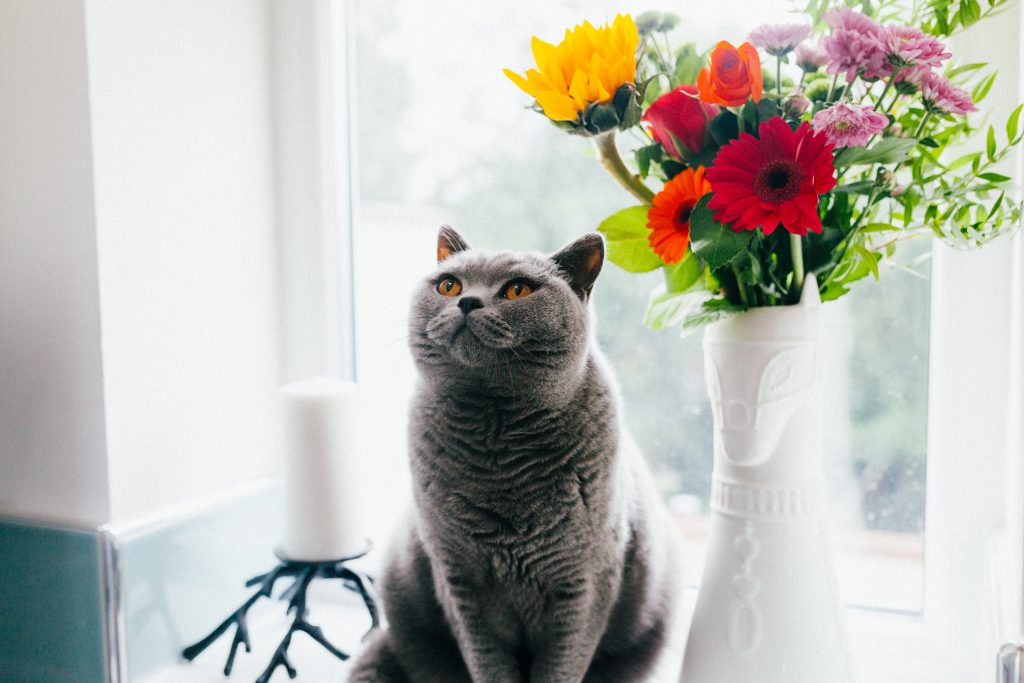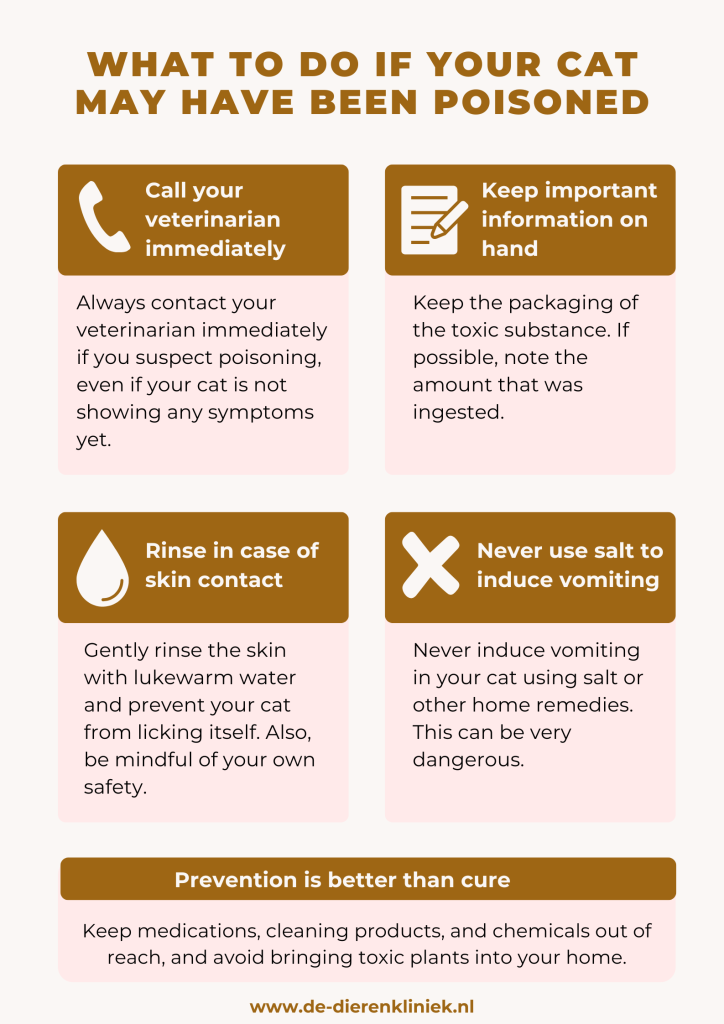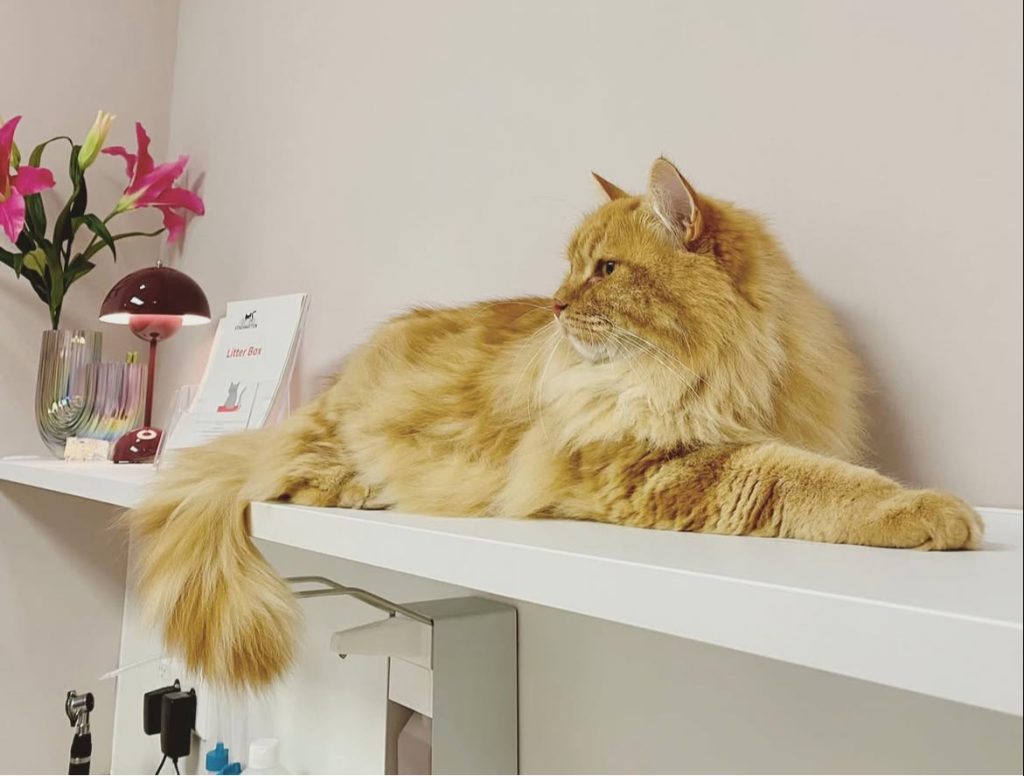Poisoning in cats

Unfortunately, poisonings in cats are quite common. Many substances that we use in and around the home are toxic to cats. This includes various household products, but some medications, foods, flowers, and plants can also be dangerous.
On this page, you will find all the information you need about poisonings in cats. You will learn how to recognize if your cat may have ingested something toxic, which substances are most commonly harmful, and how to respond in such situations.
How will a cat contract poisoning?
Cats are naturally curious, so they like to lick or bite at things. Cats also wash themselves a lot, and in this way they can ingest dangerous substances through their fur or paws, for example. In addition, it sometimes happens that a cat eats a poisoned prey animal, such as a rat or mouse.
Do you suspect that your cat may have eaten, inhaled or had something toxic on its skin? If so, always contact your vet immediately!
What are the symptoms of poisoning?
The symptoms in poisoning can be different. This depends on the type of poisoning. Sometimes, symptoms appear fairly soon after admission, but sometimes they may not appear for several days.
Common symptoms are:
- Vomiting and diarrhoea
- Bleeding
- Behavioural changes
- Low in energy
- Muscle tremors
- Cardiac symptoms
- Drinking and urinating a lot or not urinating at all
- Breathing difficulties
What to do if your cat is poisoned?

Suspect a poisoning? Always call a veterinarian for advice. Try to have the following information ready when you call. If your cat is registered with the veterinarian, their age and weight may be available in the medical record.
- Age of your cat
- Weight of your cat
- Name of the toxic substance
- Amount ingested
- Duration of contact (in case of skin/eye contact or inhalation)
- Time the exposure occurred
- Whether your cat is showing any symptoms of poisoning
- Whether you have already started any treatment
If you have the packaging of the substance involved, keep it handy and bring it with you to the veterinarian.
Is it wise to make your cat vomit in case of poisoning?
With most poisonings, it is important to make your cat vomit as soon as possible after ingestion. This way, we try to get as much of the toxic substance out of the body as possible. This should be done as soon as possible after ingestion. If the cat has ingested a drug that may be irritating to the oesophagus or where there is a risk of foaming, we will not make your cat vomit.
Treating the cat in case of poisoning
Besides making the cat vomit, other measures are sometimes needed in case of poisoning. Other actions that can be taken in case of poisoning are:
- Flushing the stomach
- Administer Norit powder (activated charcoal)
- Laxation
- Giving specific antidote
- Treating the symptoms
If there is contact with a toxic substance on the skin or eyes, try to rinse it with lukewarm water as much as possible. Make sure your cat cannot lick itself (wrap in a towel if necessary) and also take care of your own health.
Additional examination after poisoning
Some poisonings can cause damage to the organs. In this case, there will also be blood tests done by the vet, which sometimes need to be repeated after some time as changes may also be seen only later.
Dangers of salt poisoning in cats
Never try to make your cat vomit itself by giving salt. This can give your cat salt poisoning which can be fatal in some cases.
What are toxic substances for cats?
Poisoning from pesticides
- Rat and mouse poison
- Slug bait
- Herbicides
- Insecticides
Treatment: Induce vomiting, perform stomach flushing, administer activated charcoal (Norit), and give laxatives. If necessary, administer vitamin K. In some cases, a blood transfusion may be required.
Poisoning from medication
- Paracetamol
- Ibuprofen
- Overdose of medication intended for the animal itself
- Flea treatment (administered to the wrong species, e.g., cat)
- Drugs
Treatment: Induce vomiting, administer activated charcoal (Norit), give laxatives, provide intravenous fluids, and treat symptoms.
Poisoning from household products
- Antifreeze and coolant
- Cleaning products (especially those containing phenol, e.g., Dettol)
- Mothballs
- Mold removers
- Algae cleaners
Treatment: Depending on the substance, induce vomiting, perform stomach flushing, administer activated charcoal (Norit), give laxatives, provide intravenous fluids, sedation, and cooling.
Poisoning from food
- Chocolate
- Raisins/grapes
- Xylitol (sugar substitute)
- Raw potatoes
- Onions & garlic
Treatment: Induce vomiting, administer activated charcoal (Norit), and give laxatives. In some cases, additional symptom management and support with intravenous fluids may be necessary. For substances such as grapes, a blood test is also recommended and should be repeated after three days.
Poisoning from plants and bulbs
- Lilies
- Amaryllis
- Dieffenbachia
- Bulbs of daffodils, crocuses, tulips, and amaryllis
- Christmas rose & poinsettia
- Hyacinth
Treatment: Induce vomiting, perform stomach flushing, give laxatives, provide hospitalization and intravenous fluids, and administer specific antidotes.
Poisonous plants for cats
The list of plants that are toxic to your cat is very long. Most cat owners are quite shocked by this. It is reassuring to know that most plants are very bitter and foul-tasting. This ensures that a cat is quickly put off and will therefore rarely ingest a harmful amount of the toxic substance. We have listed the plants a cat is most at risk of poisoning above.
Other toxic products
- Essential oils (wintergreen, eucalyptus, cinnamon, citrus, ylang-ylang, lavender, tea tree, peppermint, clove, birch, pine)
- Blue-green algae
- Fertilizers
Prognosis & Aftercare
Fortunately, by acting quickly, it is often possible to ensure that animals do not suffer any lasting effects from poisoning. However, some poisonings do require aftercare. Certain toxins can cause damage to the organs, and these changes may only become apparent later.
If you have any further questions on this topic, please contact us!

Our clinics
Whether you come to Amsterdam or Heemstede, you will hardly notice the difference. The atmosphere is homely and warm and we welcome our clients and patients with a smile and lots of patience.
See our clinics here

